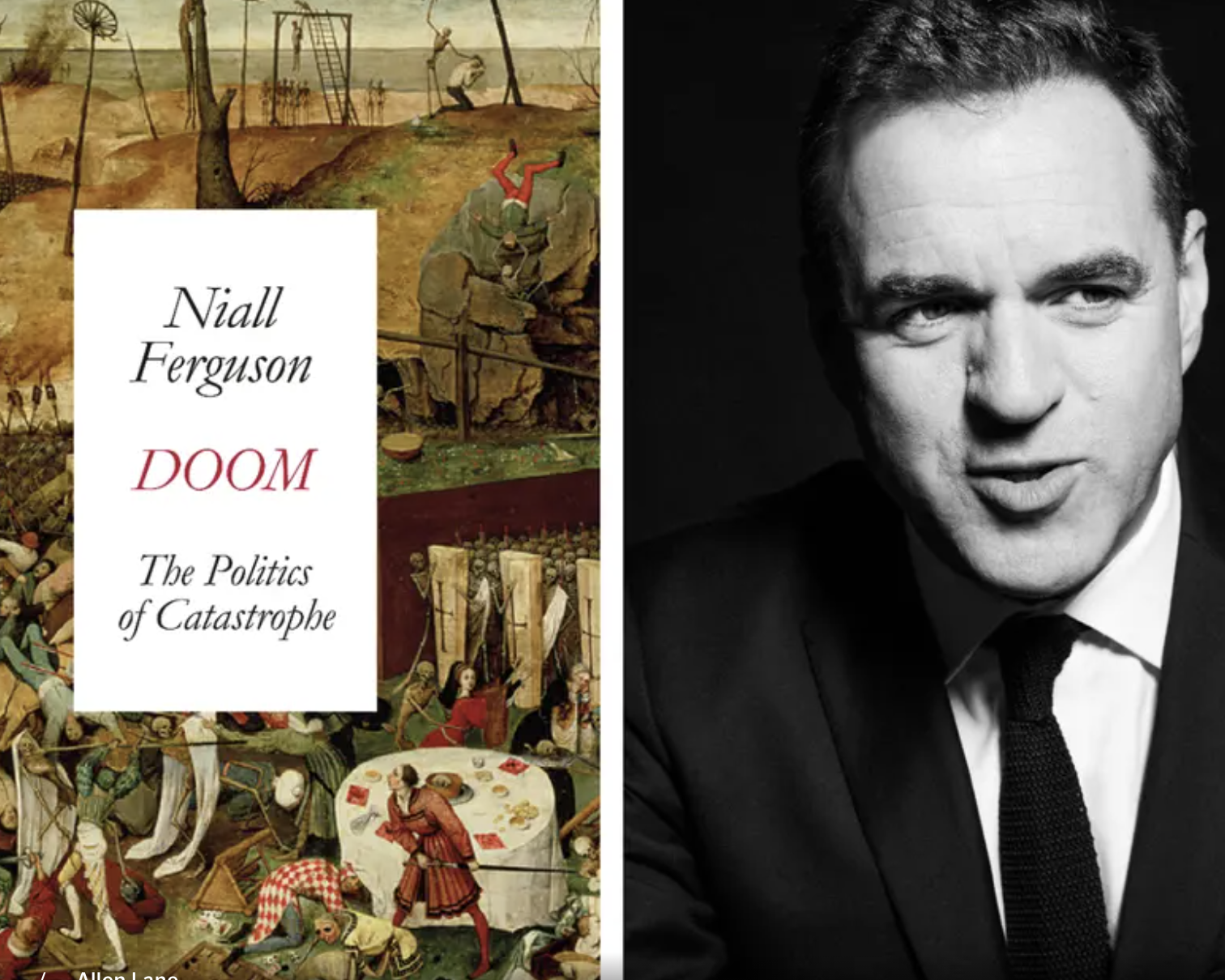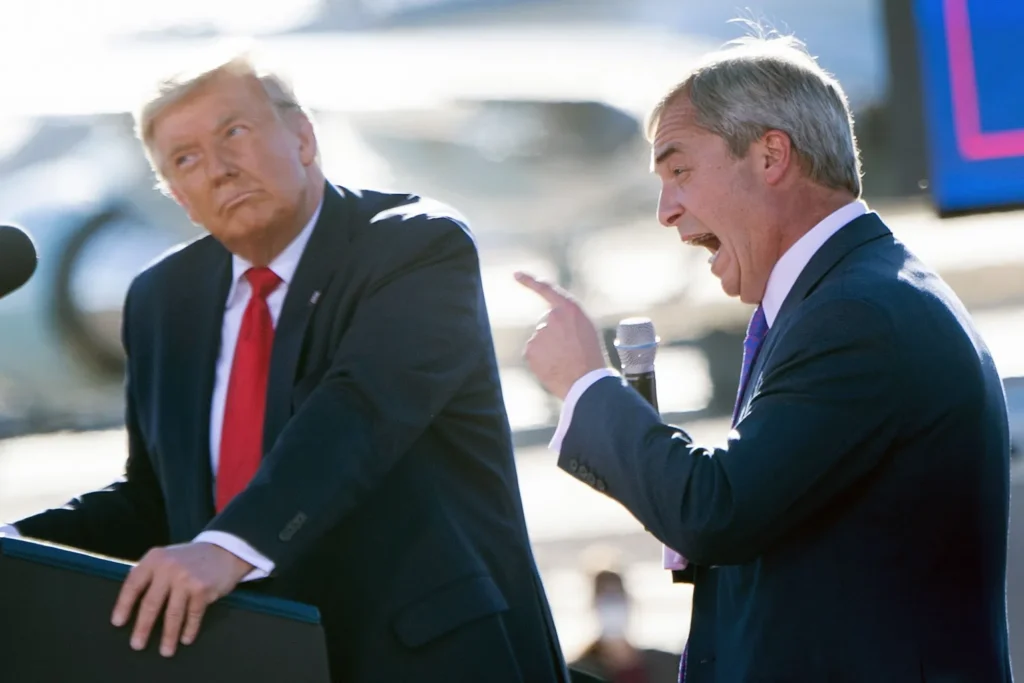
Doom: The Politics of Catastrophe by Niall Ferguson review
(Evening Standard) – From plagues and volcanic eruptions to the current Covid pandemic, mankind has always been faced with catastrophes.
Thought Leader: Niall Ferguson
That scraping sound you hear is Rachel Reeves moving the deckchairs around on the Titanic. On Wednesday the chancellor announced the reinstatement of winter fuel payments, which she had axed for most pensioners last year. She intends to claw back the money from better-off pensioners through higher tax bills and a higher means test for future payments. How she will pay the additional cost of £700 million will not be revealed until the autumn budget.
Reeves also promised £15.6 billion for improved transport links in the north of England and the Midlands, though I am sure any resemblance to the plans announced by Rishi Sunak in 2023 is purely coincidental.
Scrape, scrape. What’s that big white thing we’re sailing towards? The answer is a debt crisis. While the press dutifully pore over the size and location of the chancellor’s deckchairs, the unpleasant fiscal arithmetic is of an unsustainably high national debt. Growth is weak, stuck below 2 per cent according to the latest Office for Budget Responsibility (OBR) projections. But the debt is mounting up.
On the eve of the financial crisis in 2007-08 the gross national debt was 42 per cent of gross domestic product. Twenty years on, according to the OBR, it will have more than doubled to 105 per cent. The worst part is the rising cost of interest payments on the debt: adjusted for inflation, rates are likely to exceed growth in the next five years.
Ferguson’s Law is inexorable: when a country is spending more on interest payments than on defence — as Britain has since 2021 — it can say goodbye to being a serious military power. The other chairs being moved around this week were on the decks of our two aircraft carriers.
On Monday, Sir Keir Starmer pledged to “move to war-fighting readiness” by 2034 as he laid out the findings of the strategic defence review. But all that will happen between now and April 2027 is a minute increase in defence spending from 2.3 per cent of GDP to 2.5 per cent. As Max Hastings has pointed out, at this rate the UK will soon lag behind all European Nato countries except Spain. With a fifth of the defence budget being consumed by our new nuclear deterrent, the Royal Navy has shrunk to a size last seen at the time of the Armada.
What ails the UK? The Conservative MP Neil O’Brien calls it “the confluence”. Simultaneously, Britain is dealing with a demographic crisis (longer life, falling fertility) which mass migration was supposed to solve but didn’t; a breakdown of the mid-20th-century welfare system, which weighs down on incentives to work; rising taxes, which discourage entrepreneurship and investment; and a crisis of confidence fuelled by “woke” denigration of our history in our schools, museums and national broadcaster.
“Weak growth compounds welfarism and erodes the public realm,” O’Brien writes, “from potholed roads to urban streets that are covered in stickers and graffiti and smell of wee or weed. In a struggling economy the dynamics of a newly hyperdiverse society become more dangerous.”
Reading O’Brien’s essay I found myself wondering: was Enoch Powell right after all? Consider these facts: around one in 60 people in the UK arrived in the country in the last year, and around one in 25 in the last four years. There is now more than one asylum seeker per 200 residents in multiple cities, including my native Glasgow. It would be strange indeed if the indigenous population did not connect low growth and failing public services with the biggest influx of foreigners to these isles since the Norman conquest.
And yet decades of work as an economic historian disincline me to see the recent surge of net migration as the principal cause of our ills. As O’Brien says, it is only one of the elements of his confluence. My argument in the books War of the World and Civilisation was that multiracial or multi-ethnic societies can be as successful as homogeneous ones, and potentially more successful — if the institutions and incentives are the right ones.
The core problem of British society is not our newfound racial diversity but a system of welfare that has simultaneously acted as a magnet for migrants and a repellant, driving native-born Britons out of economic activity. Half a million people now live in households where no one has ever worked, twice as many as five years ago. There are nearly one million young people not in education, employment or training. Close to one in ten working-age adults are not in work because they are either unemployed or long-term sick. As O’Brien notes: “4.1 million people in England and Wales are on an incapacity or disability benefit — that’s one in seven adults in the northeast and Wales … We’ve gone from 2 per cent of 16-year-olds claiming in 2002 to 8 per cent in 2023.” Almost two thirds of those aged 16 to 34 cited either mental illness or “depression, bad nerves or anxiety” as their reason for being long-term sick.
It will get worse, too.

My colleague Fraser Nelson has argued that the welfare system has simply given up on reassessing cases to see if claimants are, in fact, fit for work. At this rate, the number of working-age people on sickness benefit will pass four million in 2026-27, nearly double what it was in 2018-19. Such a dysfunctional system explains not only our fiscal crisis but many of the social pathologies around us.
Consider another example. As an excellent essay in The Economist notes, “shoplifting has octupled in a decade, to around 20 million thefts a year”, while “fare evasion on London’s Tube and bus network has doubled since 2019”. Is this because the number of wicked people in our society has soared? No. It is because the police have given up on petty crime.
Prosecutions for such offences are down by 60 per cent. As a result, shops have given up on reporting them. This helps explain the steep decline in public confidence in the police. Behind that is the fact that, adjusting for inflation, spending per capita on public order and safety — policing, the courts, prisons — fell by a quarter in the “austerity years” of the 2010s and is still 8 per cent below pre-2010 levels. Police quality is lower. Courts are slower. Prisons are bursting at the seams.
It is a similar story with potholes and litter. Councils are doing less maintenance because their resources are consumed by responsibilities that include social care, special needs education and temporary housing for those at risk of homelessness. As the costs of such “statutory duties” have risen, so they have less money to spend on filling in potholes and collecting rubbish.
The Economist smartly characterises Britain’s public sector today as “a state of last resort, which focuses on screamingly urgent priorities — the nastier sort of violent crime, or complex social-care needs — to the near-exclusion of day-to-day or preventative work. An ambulance will still usually arrive in under ten minutes for a heart attack; anything urgent but not life-threatening could easily take hours”.
Strikingly, it is the voters most inclined to think “things have got worse in the past ten years” who are most likely to vote for Reform. Small wonder Reform did so well in the local elections and is leading in national polls. Small wonder Kemi Badenoch is struggling to rebuild the Tory brand. Yet it doesn’t help Starmer when he blames all the country’s woes on the party that was in power from 2010 to 2024. The voters know the malaise dates back further. So Reform poses a threat to Labour, too — and to the nationalist parties of Scotland and Wales.
The problem is that, in his role as a poor man’s Donald Trump, Nigel Farage does not have credible solutions to any of the problems I have described. On the contrary, what he has to offer would almost certainly worsen the debt crisis. Reform’s pledges on tax cuts and increased public spending are substantially larger than the savings they claim would be made by cuts to spending on “net-zero” policies, asylum seekers, DEI programmes and quangos. (I estimate the implicit increase in the annual deficit at £46-76 billion of the 2024-25 deficit.)
When you consider his proposed increase in state ownership of utilities, not to mention his pints-and-fags sitcom persona, you see that Farage’s lifetime project is to return Britain to the 1970s — not only pre-Europe but pre-Thatcher. Count me out.

The former Tory and Ukip MP Douglas Carswell’s “plan to get Britain back on track” is more convincing. Carswell persuasively argues that key changes in governance during the Blair-Brown years created a new deep state the Tories were unwilling or unable to master. The Climate Change Committee, the Environment Agency, Ofcom, the information commissioner and the system of judicial review — all these explain Britain’s current state of brokenness.
Whoever wins the next election, Carswell argues, must “insist on the King’s formal approval of specific orders in council at privy council as a condition for forming a government”. Think of orders in council as the UK equivalent of Trump’s executive orders. The new prime minister would then use such an order to amend the civil service management code, empowering them to fire “Sir Humphrey” types who sought to resist radical reform. (A precedent exists: in 1997 Tony Blair used orders in council to give special advisers the authority to direct civil servants.)
A new Department of the Prime Minister would take over most Cabinet Office functions and key Treasury responsibilities. A public expenditure and performance unit would oversee departmental budgets. Best of all, the new government would reduce the number of departments from 24 to 16. These changes would clear the way for a radical reform of immigration policy: reform “indefinite leave to remain”, legislate to roll back judicial activism and repeal the Human Rights Act 1998, which incorporates the European Convention on Human Rights (ECHR) into UK law.
Carswell’s regime would also amend Section 127 of the Communications Act 2003, which criminalises online speech deemed “grossly offensive”; repeal the Climate Change Act 2008, which mandates net zero emissions by 2050; amend the Town and Country Planning Act 1990 to simplify environmental impact assessments; conduct a red tape audit; introduce a 90-day “at will” dismissal period for new employees; and reduce government spending from 45 to 40 per cent of GDP within five years. Such radical reforms would reignite growth and pave the way for the necessary reforms of our obsolete systems of state healthcare and comprehensive schooling. It would also create the resources for a serious overhaul of our enfeebled armed forces.

Readers may consider all this with a rueful sigh and say: “It’s never going to happen, is it?” But these ideas are no more radical than those with which Margaret Thatcher won the 1979 general election. Nor has the world changed so much in 50 years that such reforms are inconceivable today. Consider what the radical libertarian Argentine president Javier Milei has achieved in only a year and a half.
He has eliminated the fiscal deficit, cutting it from 5 per cent of GDP to zero. He has reduced the number of government ministries from 18 to eight. With an executive order issued a few days after his inauguration on December 10, 2023, he fully deregulated key markets, including property rentals, commercial airlines and road freight transport. Labour market reforms took longer but were enacted after a fight in the country’s congress.
Milei has ended the artificial dual exchange rate system and restored the central bank’s independence. He has terminated so-called intermediate organisations that for years disrupted Argentine economic life with pickets and mass mobilisations. He has overhauled the import system, removing quotas, licences and non-essential certifications. And he has launched a long-term programme of tax and regulatory reform.

The result of this shock therapy has been a stunning recovery. Milei has brought monthly inflation down from 13 per cent to under 3 per cent. The economy is now growing at 8 per cent. Investors no longer shun Argentine bonds and stocks. After a brief upward jump, the poverty rate has fallen from 42 per cent when he was elected to 35 per cent. True, there is much work still to be done. But a new programme from the International Monetary Fund — Argentina’s 23rd — will provide $12 billion upfront and potentially another $3 billion, which should help Milei remove the remaining capital and exchange controls without reigniting inflation.
Most governments that cut the fiscal deficit by five percentage points of GDP pay a heavy political price for the resulting pain. Margaret Thatcher took nearly all her years in office to get the public sector borrowing requirement down from 4.5 per cent of GDP in 1978-79 to minus 1.1 per cent ten years later. But Milei defies political gravity. Last month his spokesman won the Buenos Aires city hall election.
The lesson is clear. With Labour stuck in Harold Wilson/Jim Callaghan mode and heading inevitably for “Crisis, what crisis?”, and with Farage offering secondhand populism, Badenoch needs to unleash her inner Milei. That does not mean donning a leather jacket and wielding a chainsaw, which did not work for Elon Musk. It means being the committed free-market libertarian she is — and the symbol of a successful, multiracial society that she is uniquely placed to be.
That is why I welcomed her speech yesterday calling for Britain to leave the ECHR as part of a Carswell-style transformation of our broken immigration system. Her outrage at the consequences of human rights lawfare is unfeigned. As Milei has shown, nothing sells radical reform like authenticity and audacity.
That whooping sound I hope soon to hear will be Badenoch’s version of Milei’s battle cry, “Viva la libertad, carajo!” — “Long live freedom, damn it!”
WWSG exclusive thought leader, Niall Ferguson provides insightful discussions where he explores key geopolitical shifts. With a deep understanding of economic and security dynamics, Ferguson brings a historical perspective to today’s most pressing global challenges. To invite Sir Niall Ferguson to your next event, contact WWSG.
Doom: The Politics of Catastrophe by Niall Ferguson review
(Evening Standard) – From plagues and volcanic eruptions to the current Covid pandemic, mankind has always been faced with catastrophes.
Thought Leader: Niall Ferguson
Time to end secret data laboratories—starting with the CDC
The American people are waking up to the fact that too many public health leaders have not always been straight with them. Despite housing treasure…
Thought Leader: Marty Makary
David Frum: How Harris Roped a Dope
This piece is by WWSG exclusive thought leader, David Frum. Vice President Kamala Harris walked onto the ABC News debate stage with a mission: trigger…
Thought Leader: David Frum

